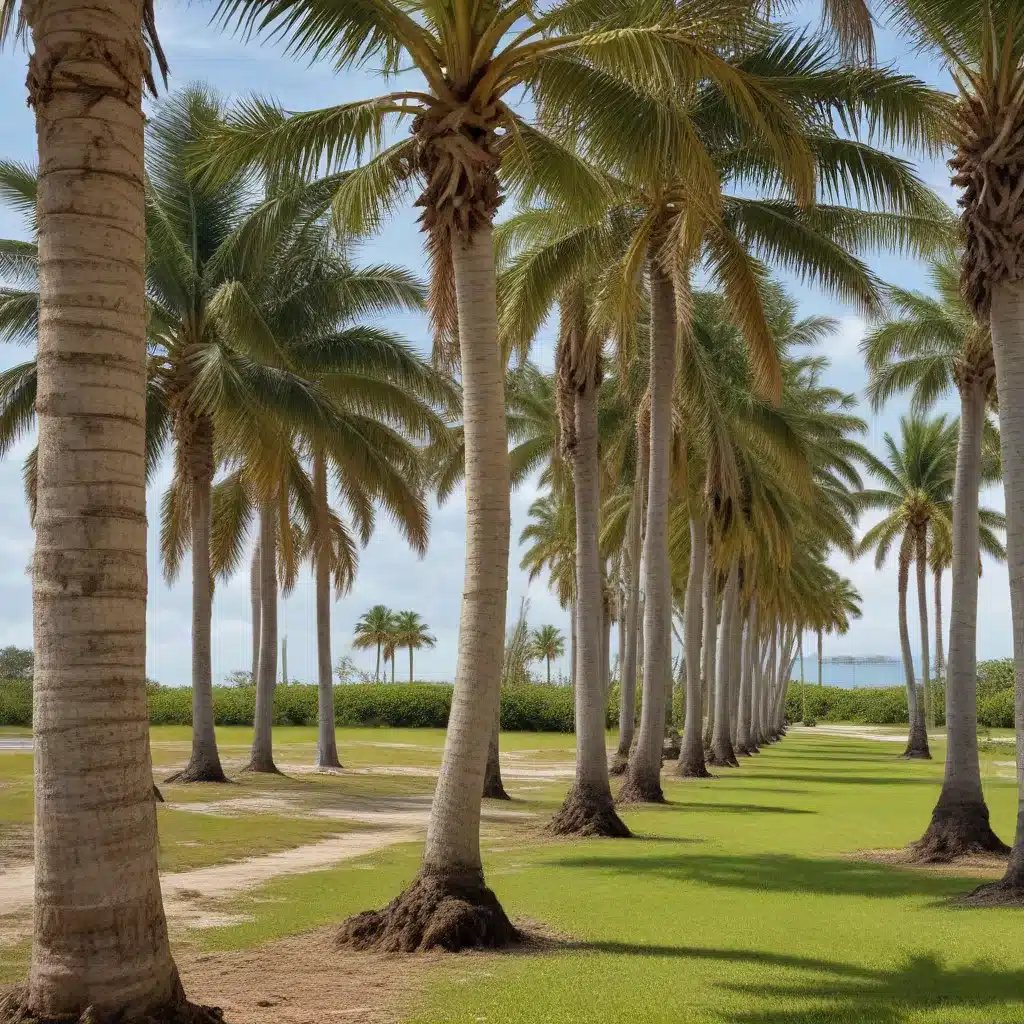
Managing the Impacts of Soil Alkalinity on Palm Tree Health in Coastal South Florida
The vibrant palm trees that adorn South Florida’s coastal landscapes are iconic symbols of our subtropical paradise. However, these tropical giants face a unique challenge in our region: soil alkalinity. The calcareous soils common to our coastal areas can significantly impact the health and growth of palms, requiring specialized care and management.
Soil Alkalinity Considerations
Soil alkalinity, characterized by a high pH, is a prevalent issue in many coastal areas of South Florida. This alkaline condition can have profound effects on the nutrient availability and overall vitality of palm trees. When soils are too alkaline, essential nutrients like iron, manganese, and zinc become less accessible to the plant’s roots, leading to deficiencies and stunted growth.
To assess the state of your palm’s growing environment, it’s crucial to conduct soil testing and analysis. This will provide valuable insights into the pH, nutrient levels, and other characteristics of your soil. Armed with this information, you can then develop an effective plan to address any imbalances or deficiencies.
Remediation Strategies for Alkaline Soils
Fortunately, there are several remediation strategies that can help counter the effects of soil alkalinity on palm trees. Incorporating organic matter, such as compost or peat moss, can help lower the soil pH and improve nutrient availability. Additionally, the application of sulfur-based amendments can effectively acidify the soil, making it more hospitable for palm growth.
In cases of severe alkalinity, you may need to consider more extensive soil replacement or raised planting beds. By creating a nutrient-rich, well-draining growing medium, you can ensure your palms have the optimal conditions to thrive.
Tropical Storm Preparedness for Palm Trees
In the hurricane-prone region of coastal South Florida, wind resistance and anchoring are crucial considerations for maintaining the health of your palm trees. Palms with strong, deep root systems and properly pruned canopies are better equipped to withstand the powerful gusts of tropical storms.
Proactive measures, such as staking young palms and regularly inspecting for loose or damaged fronds, can go a long way in preparing your landscape for inclement weather. Additionally, having a damage assessment and recovery plan in place can expedite the post-storm restoration of your palm collection.
Paying close attention to potential storm-related diseases, such as bud rot and lethal yellowing, can also help you identify and address issues quickly, minimizing the impact on your palms.
Pest and Fungal Issues in Alkaline Soils
The chalky, alkaline soils of coastal South Florida can also make palm trees more susceptible to certain pests and fungal diseases. Common pests like the palmetto weevil and the Caribbean red palm mite thrive in these conditions, while fungal pathogens like Ganoderma butt rot and Phytophthora root rot can take advantage of stressed palms.
Employing an Integrated Pest Management (IPM) approach is essential for addressing these challenges. This involves a combination of cultural, biological, and targeted chemical controls to maintain a healthy, balanced ecosystem around your palm trees.
Fertilization Strategies for Alkaline Conditions
Maintaining proper nutrient balance and availability is critical for the long-term health of palm trees in our coastal region. The high pH of alkaline soils can inhibit the uptake of essential micronutrients, leading to characteristic deficiencies like iron chlorosis and manganese deficiency.
To combat these issues, tailored fertilizer formulations that address the specific needs of palms in alkaline conditions are a must. Slow-release, chelated products containing the necessary micronutrients can help ensure your palms receive a steady supply of what they need to thrive.
Timing and application methods are also crucial, as you’ll want to avoid flushing valuable nutrients away during heavy rainfall. By carefully managing your palm’s fertilization regime, you can ensure optimal growth and resilience.
Palm Species Selection for Coastal Environments
Not all palm species are created equal when it comes to thriving in the alkaline, salt-laden environment of coastal South Florida. When selecting palms for your landscape, it’s essential to choose alkalinity-tolerant cultivars that can adapt and flourish in these challenging conditions.
Some of the most suitable palm varieties for our region include the Canary Island date palm, the Chinese fan palm, and the Pindo palm. These species not only tolerate higher soil pH levels but also exhibit superior salt tolerance, making them well-suited for the coastal lifestyle.
By carefully considering factors like microclimate, exposure, and growth habits, you can ensure your palm choices will enhance the beauty and resilience of your South Florida landscape.
Planting and Establishment Guidelines
Proper site preparation and soil amendments are critical when planting new palm trees in coastal South Florida. Amending the soil with organic matter and sulfur-based products can help offset alkalinity and create the ideal growing conditions.
Meticulous planting techniques, such as ensuring the root ball is at the correct depth and providing ample water during the establishment period, are also crucial for the long-term success of your palms.
Ongoing Palm Tree Maintenance
Even after your palms are well-established, vigilant monitoring and proactive care are necessary to maintain their health and vitality. Regular pruning and canopy management can help prevent issues like frond decline, while tailored irrigation and drainage practices can ensure your palms receive the right amount of water.
By staying attuned to the unique challenges posed by our coastal environment, you can ensure your palm trees continue to thrive and enhance the beauty of your South Florida landscape for years to come.
For more expert guidance on managing palm trees in the coastal regions of South Florida, be sure to visit www.southfloridatrees.com.


